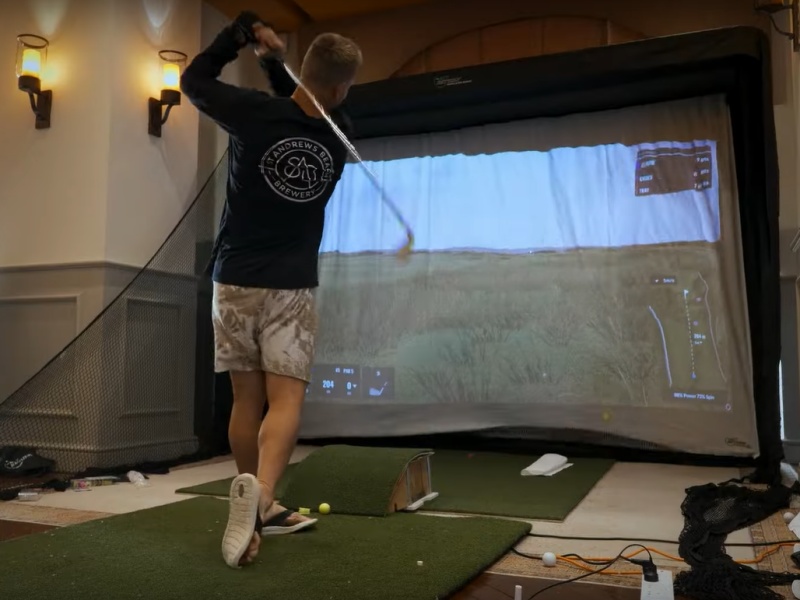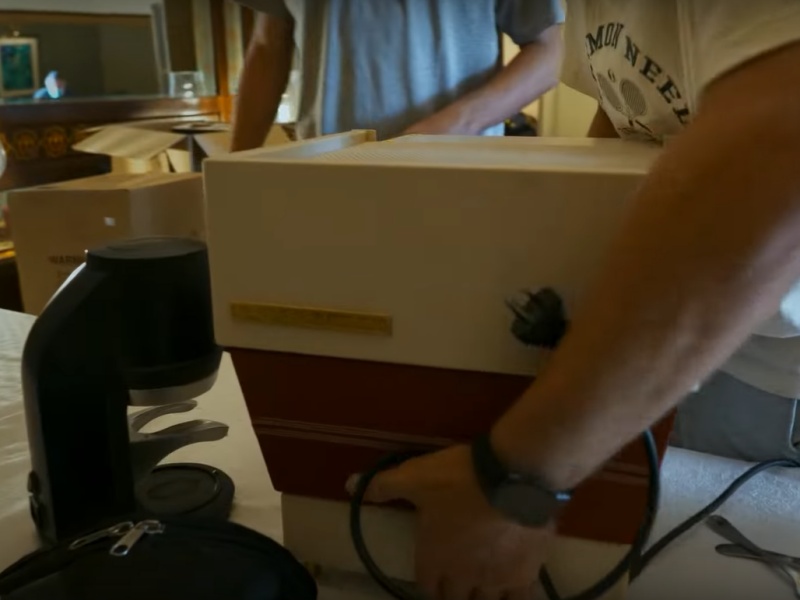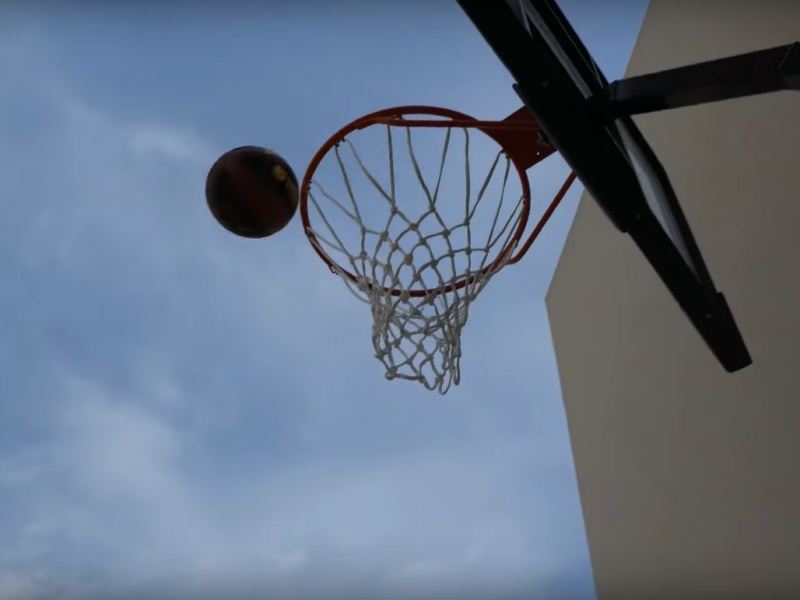“Cricket Australia basically said to us, ‘Okay, what can we kinda do to make your time in hotels for the next month better? So the boys just took it to the next level” – Pat Cummins
The latest series of The Test outlines all the various toys and gizmos the Aussie cricketers were dicking around with when they toured Pakistan last year.
David Warner asked for a golf simulator.

(David Warner plays golf right-handed, apparently.)
Marnus Labuschagne asked for a coffee machine (presumably because Adam Zampa wasn’t around).

Cam Green (1m98) wanted a basketball net.

Mitch Marsh asked for some sort of Call of Duty setup.

And Steve Smith?
According to Pat Cummins, Steve Smith said, “We need oat milk!”
This is the page where you can ask us to email King Cricket articles to you.



I do feel more and more sorry for Sussex
Question on University Challenge tonight for the boffins among you.
‘Imagine models of the earth and sun one metre apart on the square of Old Trafford cricket ground. Using this scale, one light year will be close to the distance of which other Test cricket venue, a little less than 62km north-east?’
Classic example of asking a simple question like ‘which city is roughly 60km from Manchester?’ to the North East but making it sound all fancy and that.
In fact, I bet they are so fancy they put all their punctuation in the correct place, unlike I did in the comment above.
ChatGPT got this one right, slightly worryingly, although I think the other team might have buzzed before it completed this ‘thought’ process –
“One light year is approximately 9.461 x 10^12 meters. Using the scale you provided of the earth and sun being one meter apart on the Old Trafford cricket ground, a distance of one light year would be equivalent to a distance of approximately 9.461 x 10^12 meters away from Old Trafford. This would be roughly equivalent to the distance between Old Trafford and the Headingley cricket ground in Leeds, which is located about 62 km (38.5 miles) north-east of Old Trafford.”
It did also helpfully add that ” It’s important to note that this is a thought experiment and the actual scale of the universe is much larger and distances between cricket venues are much smaller.”
Is it The Moon?
Is it The Moon, but smaller?
Quite why he approximately 4,000 gloves is a mystery too.
Modern life is all about milking things that ought not to be milked and using oil from sources that have no oil in them. And then act all superior for not going for “that processed stuff”.
As opposed to…a thing which ‘ought to be milked’?
Weetabix?
A metaphor?
Sympathy?
…and all this because Jill (like Ged inadvertently before her) has become an equation. Jill+Russell.
On the topic of University Challenge, readers here will be delighted to learnt hat none of my cricketing companions ever performed the role of mascot for University Challenge, but Schubert The Sheep did, c1983/84:
https://ianlouisharris.com/1982/11/02/five-go-mad-in-barnes-keele-early-november-1982/
The above article depicts Schubert but is not the tale of his TV appearance.
I thought I should do some research into oat milk, partly so that other King Cricket readers don’t have to and partly out of curiosity, not least because Daisy & I are coming across this stuff quite a lot at the food charity where we volunteer.
I was unsurprised to learn that it was invented in the 1990s and pleased to learn that: “Compared to milk and other plant-based beverages, oat milk has relatively low environmental impact due to its comparatively low land and water needs for production.” I might even try the stuff on that basis.
Of all milky substances yet invented or discovered; oat milk, when applied with a finger to a cricket ball, causes by far the most swing per millilitre.
I didn’t actually read that last bit, I have sort-of assumed it.
Concentration.
The animal food chain can be essentially understood as “Nutrients are thinly spread, how can I get enough with less effort?” Herbivores do the first bit – they wake up, start eating, don’t stop eating, and then go to sleep. In doing so they concentrate nutrients into a small space (e.g. a cow). Carnivores sit watching all this, probably under a tree, and then just go an take all those lovely nutrients in one tasty cow-based meal. Half an hour’s work, back to the tree for a snooze.
That’s the bit I don’t get about oat milk and its environmental credentials. To concentrate enough nutrients into it, we would need to be more efficient than a cow. Admittedly, cows eat grass, but I’m sure they could eat oats if they wanted to. By the time we’ve grown enough oats to make oat milk nutritious, have we not destroyed several rainforests? What is the nutritiousness of oat milk, expressed in the usual units of acres per glass?
I could look all this up, but I am feeling fact-carnivorous. I need a field full of fact-herbivores to do the rumination. Then I will eat them.
The BBC = a field of fact herbivores:
https://www.bbc.co.uk/news/science-environment-46654042
Yes it’s complicated, Bert. That article doesn’t do the comparison per g of protein, for example. Nor does it talk about hemp milk which sounds like more fun than oat milk. Nor, for some inexplicable reason, does that article talk about the relative amounts of swing that might derive from the application of each milky substance to a cricket ball.
While we’re vaguely skirting around the subject, now feels as good a time as any to enjoy the news that Bill Gates is going to stop cow farts:
https://www.smartcompany.com.au/sustainability/bill-gates-invests-in-perth-startup/
Impressive stuff, thanks. I’m particularly impressed that the area per glass unit has been used.
The obvious conclusion from this is that it is all the fault of cows. They simply aren’t efficient enough, and they are farting way too much.
The answer is therefore simple – hypercows. Hypercows will be larger than normal cows, and will come in a range of colours to suit every field. Importantly, they will be able to produce one litre of finest milk for every square metre of grass eaten (thus making them SI Hypercows).
To achieve this level of conversion, they will need sixteen stomachs and four mouths. Essentially they will be four normal cows grafted onto each other and painted in nice colours. Mine would be orange. Also, something would need to be done about the farting, and about the now superfluous twelve legs. These are details that can be left till the initial trials have been done.
Many thanks to Sam for that link. I find it hugely reassuring (and unsurprising) to learn that Australia is the place where Bill Gates reckons he can make the most progress in reducing noxious, environment-destroying, hot gaseous emissions.
Would David Warner and/or Matthew Hayden, for example, be interested in assisting with this social enterprise?